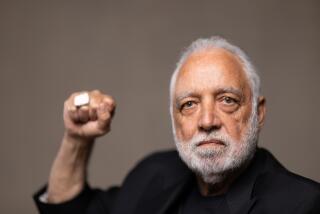A reunion that’s a symbol of hope
- Share via
Booker Wade is an old civil-rights warrior from Tennessee.
He’s got some dramatic stories to tell, including one that involves some angry Memphis police officers. In the early 1960s, his mom put him on a bus for a long ride to Los Angeles and a new life in California.
No one is writing Booker Wade’s name in grade-school assignments for Black History Month. But in my Guatemalan American family, he’s a living legend.
“Booker, thanks for taking my mother to the hospital,” I told him when we met in Palo Alto last week, and it was hard not to say it without tears welling up in my eyes because I’ve been waiting four decades for the chance.
Wade is 66 now and a veteran lawyer and media activist. Like many black people of his generation, he played many small but critical roles in the big social movements of his day. And he’s spent many years trying to make the words “equality” and “diversity” mean something.
He grew up in a segregated place where people overcame hardships by sharing with their neighbors. Maybe that explains why it was Wade who stepped forward to give my mother a ride to Los Angeles County General Hospital in 1963 on the night I was born.
Today, blacks and Latinos live side by side in many different corners of L.A. Relations between these neighbors are defined, increasingly, by piled-up misunderstandings. But back then we were just starting to get to know each other.
My mother and father were newly arrived Guatemalan immigrants then, living in an East Hollywood apartment building, down the hall from Wade. They acknowledged his friendship by asking him to be my godfather.
A few years later Wade moved to the San Gabriel Valley and then Orange County and my parents lost touch with him.
What I knew about my godfather came mostly from my mother’s telling of the “miracle” of his arrival.
My mother said that while she was pregnant she prayed for help to Martin de Porres, the first black saint in the Americas. A little while later, she met Wade in the laundry room.
“He told me, ‘It doesn’t matter what time, pound on my door. I will help you,’ ” she recalled.
Later, Wade translated for her at the hospital. She was a woman without a car or much English, and believed that San Martin had sent one of his “brothers” to guide her.
I told this story in a column last year. Thanks to the readers of The Times, I was able to find Booker Wade.
Wade was studying Spanish at Los Angeles City College when he met my mother.
“We were both newcomers and we were both helping each other,” he told me. “We were strangers in paradise.”
In East Hollywood, my father learned to read English at the nearby public library.
After the poverty of provincial Guatemala, Los Angeles was a place of reinvention and opportunity.
It was for Wade too.
When he arrived in Los Angeles in 1961, he had never lived outside of a black community.
“All of us were a bit of outsiders,” Wade told me of meeting my parents. “But there was comfort in our friendship.”
Wade had come to Los Angeles as an 18-year-old, one of thousands to leave the Deep South in what’s known as the Great Migration.
Back in Memphis, Wade’s mother Florence Fowler had imparted some basic values, he told me: “education, community, hard work, and, of course, religion.”
Wade told me he joined the Memphis chapter of the NAACP, and that he and other black teenagers were arrested while protesting the segregated hours at the central branch of the public library.
“I remember being hauled off, in a wagon, by these three really burly policemen,” he told me.
The officers drove the teens in circles through the city, and taunted them with the name of a black 14-year-old who’d been tortured and killed in Mississippi a few years earlier: “Boys, your name Emmett Till?”
Wade was released. But his mother put him on that bus, he said, because she was worried that her idealistic son would eventually get himself killed.
He arrived in a less crowded version of L.A. than we know today. California had a seemingly limitless supply of sunshine and open-minded people.
“It was dreamland,” he said. “It was an inspiring and astonishing way to live.”
Wade enrolled at LACC and was soon elected to student government.
On Dec. 14, 1962, Martin Luther King Jr. spoke at the college. Afterward, King had lunch with student leaders, including Wade.
“We were all pounding on him about his competition with Malcolm X,” Wade told me. “We were militants. We wanted more now.”
King met with the students for 40 minutes and impressed them with his deep convictions.
Some two months later, Wade became my godfather.
I talked to my godfather for three hours and in the end I concluded that the real Booker Wade was even more impressive than the legend I’d grown up with -- he’s a gentle and generous soul who links my family’s story to the heroic narrative of African American history.
All of us share a debt to black history. The civil rights movement, after all, helped institutionalize ideas about equality and fairness that help all sorts of people.
Today, more than ever, our lives are mixed up and blended together. My gut tells me that if we go out in this crossroads city and find the experiences and the stories we share, Los Angeles will be stronger for it.
hector.tobar
@latimes.com
More to Read
Sign up for Essential California
The most important California stories and recommendations in your inbox every morning.
You may occasionally receive promotional content from the Los Angeles Times.














